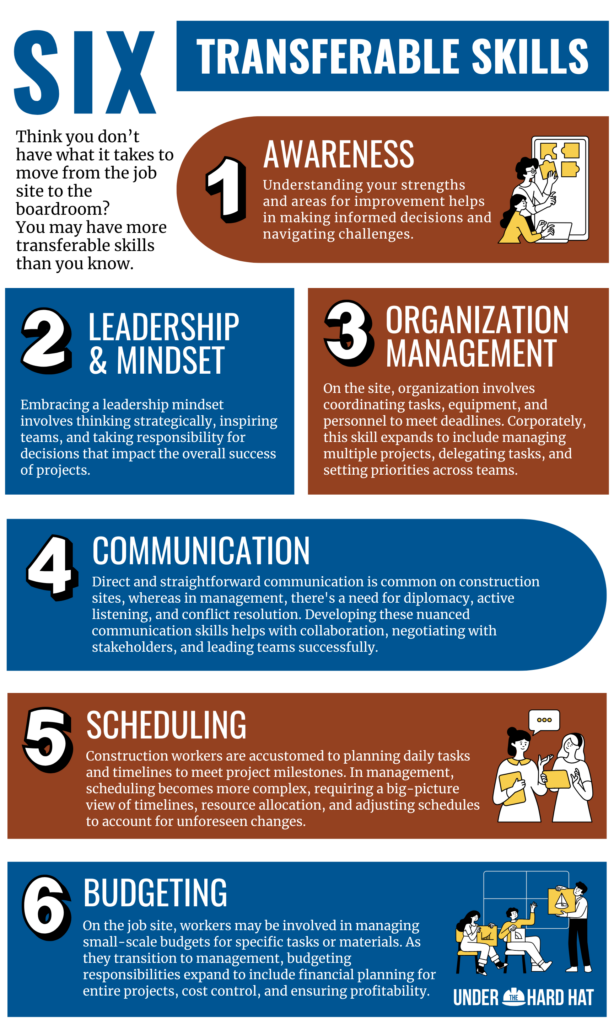Making the leap from hands-on construction work to a managerial role isn’t just about trading in your work boots for a desk job—it’s a shift that demands new skills, a different mindset, and a fresh approach to challenges. Cory Fisk, Founder of Construction Management Online and career coach for construction workers, has experienced firsthand how difficult this transition can be for those accustomed to the rhythm of physical labor. With the right guidance and preparation, even the most seasoned tradespeople can successfully navigate the shift from field to office.
As the demand for effective leaders in the construction industry continues to grow, learning to bridge the gap between fieldwork and management has become more important than ever. This shift requires not just a change in tasks but also in thinking, and with proper guidance, workers can restructure the skills needed to thrive in their new roles.
Navigating limited managerial opportunities
As workers climb the career ladder in construction, the number of available managerial positions narrows considerably, creating a bottleneck effect. “There just aren’t as many positions available in that C-suite that we would like to have,” explains Fisk. This scarcity can make the transition into management more competitive, intensifying the pressure on workers who aim to advance.

To navigate this bottleneck strategically, it’s important to recognize the value of alternative career pathways that may not carry traditional titles but are just as impactful. “Moving into a superintendent position could be just as or more valuable than moving into a project management position,” says Fisk. “The superintendent role demands intimate knowledge of construction processes and offers technical experience that is highly sought after in the industry.” By broadening the understanding of what constitutes a successful career in construction, workers can take a flexible approach to growth, exploring diverse roles that open doors to meaningful leadership opportunities.
Understanding the barriers: The mental shift to management
Transitioning from fieldwork to a managerial position involves more than acquiring new skills—it requires a complete change in mindset. For years, construction workers have measured their value by getting as much work done as efficiently as possible. However, when transitioning into management, the goal shifts from executing tasks to overseeing, delegating, and guiding others. “Their brain has been exercised in a certain function of operation,” Fisk explains. “Now they’re asking their brain to take what they know how to do and transition that into becoming an effective communicator, detailing steps and actions for someone else to perform the work… it can be challenging.”
The cultural differences between the job site and the corporate environment compound this mental shift. On the job site, workers experience a strong sense of camaraderie, often forged through years of hard labor. “There’s a brotherhood that is experienced on the job site that you don’t get on the corporate side,” Fisk says. This close-knit culture can be challenging to leave behind, especially when moving into an office setting where relationships may seem more transactional. Workers may also struggle to adapt to the nuances of communication in a corporate environment, where diplomacy, social awareness, and political correctness are essential.
Mindset matters and transferable skills: Leveraging what you already know
Succeeding in the shift to management goes beyond mastering new tasks. It involves recognizing and embracing the transferable skills developed on the job site. “If you can manage your life, you can manage a project,” Fisk says, emphasizing that skills like organizing tasks, managing schedules, and anticipating problems are valuable in management roles.
Workers sometimes underestimate their readiness for leadership because they haven’t held an official managerial title. However, the experience gained from overseeing crew members or troubleshooting issues on-site can be a foundation for effective management. “They often think, ‘I don’t have the experience to be a manager because I’ve never done it before,’ not recognizing that overseeing individuals on their crew is representative of management skills,” Fisk explains.
In the field, workers naturally develop the ability to see the bigger picture, understanding how individual tasks fit into the broader project. This perspective is equally important in management, where strategic decision-making relies on looking beyond day-to-day details to achieve long-term goals. “It’s about looking at the structure and the systematic aspect of a project instead of just it being a construction project,” says Fisk. By reframing everyday experiences as leadership preparation, workers can confidently approach management roles.

Creating a culture of growth: What companies can do
Companies must actively support career growth through training, mentorship, and cultural change for workers to successfully transition from the field to management. “Don’t just talk about it; actually do it and follow up on progress at all levels within your organization,” advises Fisk. Offering practical opportunities for skill development helps create an environment where career advancement feels achievable.
Mentorship plays a vital role in this process, providing guidance and fostering the development of technical and softer skills like communication and conflict resolution. “Mentorship is key, and we’re all capable of practicing it,” Fisk says. It can take many forms, from a seasoned worker teaching a newcomer how to use a tool properly to structured mentoring programs designed to prepare workers for management. “It can happen with the guy in the trench who knows how to hold the shovel properly and helps the guy on his first day so he doesn’t kill his back,” she adds.
However, to be effective, mentorship requires time and dedication, which can be challenging when superintendents and managers are focused on running their projects while also trying to learn a new career path. By prioritizing mentorship and involving experienced leaders in these roles, companies can help bridge the gap between fieldwork and management, guiding workers through the transition.
In addition to mentorship, addressing biases between fieldwork and management roles is crucial for fostering growth. Fisk explains, “There is often a lingering perception that ‘grunt work’ on the job site is less valuable than corporate roles.” These biases can discourage workers from pursuing management opportunities. Companies should actively work to eliminate these perceptions by promoting transparency and fostering mutual respect. “The best way to work on it is to open the door and allow people to see what everyone else is doing in their job,” Fisk suggests, which helps create a culture of appreciation for each role across all levels.
Redefining failure and building resilience
Setbacks are inevitable in the journey from fieldwork to management. However, how these setbacks are perceived can significantly affect career growth. “I really encourage people to redefine what failure means,” says Fisk. Redefining failure is an opportunity for learning and growth, rather than a definitive end.” Viewing obstacles as valuable experiences rather than roadblocks allows workers to develop resilience and continuous improvement.
“Each misstep provides an opportunity to reassess, adjust strategies, and develop a deeper understanding of the tasks at hand,” Fisk adds. Adopting a growth mindset means understanding that most failures provide a second chance. By learning from these experiences, workers can refine their skills and become more adaptable, preparing themselves for leadership challenges while building self-confidence.
Building leadership skills on the job site
Building leadership skills doesn’t have to wait for a promotion—it can start on the job site. Workers should take the initiative by volunteering for tasks that stretch their abilities and demonstrate readiness for greater responsibility. “Be the one who’s ready to step up and take on situations or tasks that you don’t know if you’re ready for,” Fisk advises. This proactive approach not only accelerates career growth but also develops resilience.
Skill development can also extend beyond the job site through continuous learning. “It’s really important for corporate hopefuls to understand the importance of exercising both sides of their brains,” says Fisk. “Reading a leadership book, attending a webinar, or doing something that puts them out of their comfort zone once a month can help them elevate and learn.” These activities build essential skills for a well-rounded professional and personal life.
The continuous journey of growth and learning
Transitioning from the field to management is not a one-time leap but an ongoing journey of growth and self-improvement. It requires dedication, openness to learning, and a commitment to continuous development. By seeking mentorship, embracing challenges, and redefining setbacks as learning opportunities, workers can adapt and thrive in their new roles.
Career growth is a process, not a destination. Every step—whether it’s taking on a new responsibility on the job site or pursuing additional training—contributes to the broader journey of becoming a stronger leader. The path to management may not always be straightforward, but with persistence and the right mindset, it can be a rewarding career trajectory.
Like this and want more? Subscribe to our weekly newsletter and stay up-to-date with valuable resources and advice on career growth in the construction industry.



1 comment